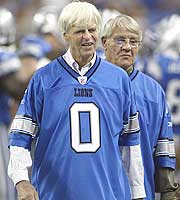 With the All Star Game coming up, I thought of the late George Plimpton's experiences before the 1960 all star game, played at Yankee Stadium, and recounted in his book Out of My League. Plimpton pioneered what came to be known as participatory journalism. He played goalie for the Boston Bruins, played tennis with Poncho Gonzales, boxed Archie Moore, golfed with Jack Nicklaus, and famously served a stint as pre-season quarterback for the Detroit Lions - an experience which led to the best selling book and hit movie Paper Lion. Plimpton's personal life was not unlike his professional one - he was a tank driver in the U.S. army from 1945-1948, became close friends with Harvard University classmates Rafer Johnson, and Robert Kennedy, and, in fact, was one of the men who wrestled Sirhan Sirhan to the ground after that assassin shot Robert Kennedy.
With the All Star Game coming up, I thought of the late George Plimpton's experiences before the 1960 all star game, played at Yankee Stadium, and recounted in his book Out of My League. Plimpton pioneered what came to be known as participatory journalism. He played goalie for the Boston Bruins, played tennis with Poncho Gonzales, boxed Archie Moore, golfed with Jack Nicklaus, and famously served a stint as pre-season quarterback for the Detroit Lions - an experience which led to the best selling book and hit movie Paper Lion. Plimpton's personal life was not unlike his professional one - he was a tank driver in the U.S. army from 1945-1948, became close friends with Harvard University classmates Rafer Johnson, and Robert Kennedy, and, in fact, was one of the men who wrestled Sirhan Sirhan to the ground after that assassin shot Robert Kennedy.
Plimpton's first experiment with participatory sport's journalism was arranged by Sports Illustrated, the publication for which he was writing, in 1960. Before the All-Star game began, Plimpton would pitch to both starting line-ups - with points awarded for each base gained. The winning line-up would receive $1000. He only made it through the first eight batters for the National League. Of course it was a line-up that included Ernie Banks, Willie Mays, Gil Hodges, and Bill Mazerosky. Although he only gave up a single, a double, and an Ernie Banks home run (he was backed up by an American League defensive squad that included Billy Martin and Mickey Mantle), he left the field destroyed before he retired the side. He had thrown more than one hundred pitches, had severe bone bruises on his glove hand from the hard throwing of Yankee catcher, Elston Howard, and had experienced such fatigue that he nearly fainted on the mound.
Worse, was the lack of emotional support he got from his team-mates. There were no words of encouragement or advice as he was methodically destroyed by the power of National League hitting. Except for Billy Martin, they wouldn't even make eye contact with him. Why should they? He wasn't a real baseball player. Even in 1960, $1000 seemed like small change to a big-time ball player - surely not enough to participate in a stunt for a magazine journalist.
The closest I've ever been to baseball greatness is a friendship with Duane Salisbury, former preacher at Laurel and Oxon Hill, MD who pitched to Thurmond Munson at Kent State. I also got within spitting distance of Marge Schott and her beer-swilling St. Bernard, "Shottzy" once (I say "spitting distance" because that was a course of action I briefly considered), but I don't classify that a brush with greatness.
Every day you and I do commune with the truly great. On Monday we may spend time with David as a boy facing Goliath, on Tuesday we are with him as the repentant king who pours his heart out in Psalm 51. Wednesday may find us at sea with the apostle Paul, and on Thursday we cower with Peter, James, and John in the snow of Mt. Hermon as Jesus is transfigured. Friday might find us in Martha's kitchen. Come Saturday we are outside the city of Phillipi with Lydia. On Sunday we are with John and Mary at the foot of the cross. These men and women are not just characters in a book, but are alive - as the Word is alive (Hebrews 4.12), and as God is the God of the living, not the dead.
Indeed, the Bible says that these Hall of Fame saints are aware of us, of our struggle. They are the "great cloud of witnesses" (Hebrews 12.1ff) who encircle us in the stadium, and cheer us on as we run our life-course. We too are saints - we belong to them and they to us, as we all belong to God. Abraham, Noah, David - they are our team-mates. They are invested in our success, because we participate with them in the same victory.

